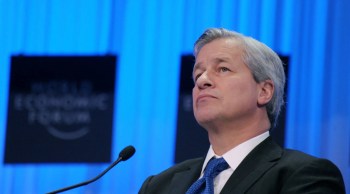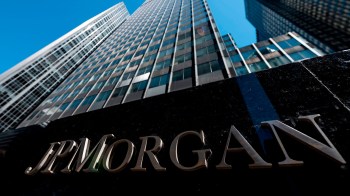JPMorgan throws ‘toxic’ plan for a loop
TEXT OF STORY
Kai Ryssdal: If you’re keeping track, today makes it three in a row for the banking industry. This morning JPMorgan Chase joined Wells Fargo and Goldman Sachs in having a very healthy first quarter. More than $2 billion in profit. And so on the theory that good things come in threes, we got some analysts on the phone this morning. We asked them whether the events of the week might finally mean things are turning around.
PAUL MILLER: It’s wishful thinking. I tell you, my life can only get easier going forward if this was the first sign of a recovery.
Paul Miller’s a managing director at FBR Capital Markets, one who is not sure the profits from JPMorgan and all the rest are going to last.
MILLER: All these revenue streams are very volatile. They don’t usually attract a good multiple too trading-wise because it’s not really good solid core income.
We talked to Peter Cohan as well. He runs his own consulting firm. And he reminded us of the mark-to-market rule change of a couple of weeks ago. The one that lets banks tell us how much their piles of mortgage-backed securities are worth.
PETER COHAN: I think we’re getting a little ahead of ourselves here. I think one quarter of good results is nice. I mean it’s certainly better to beat expectations. You know if they can sustain those results and if those results are based on real money making as opposed to one-time gains or losses from accounting changes than I think people will start to gain confidence.
Those bad assets and what to do about them were the real news that came out of the JPMorgan earnings announcement today. Didn’t happen ’til about halfway through the conference call with analysts, though. When CEO Jamie Dimon said he is not going to be part of the government’s program to help banks unload those assets, the program called the Public-Private Investment Program — P-PIP.
JAMIE DIMON: We have no intent of using P-PIP at all. We don’t need it. You know, we have our own assets. If we want to sell them we’ll sell them. We mark them properly. If we want to buy them we’ll buy them. We’re certainly not going to borrow from the federal government because we’ve learned our lesson about that.
‘Nuff said on that one, I suppose. But seeing as how Dimon runs about the only big Wall Street bank to have thrived over the past year, what do you suppose what he said means? Both for the plan having a chance to work and how healthy other banks might be. From New York, here’s Marketplace’s Jeremy Hobson.
JEREMY HOBSON: If you want to know what happens when participation in a government program has a stigma attached to it, just look at TARP. All the participating banks want to return Washington’s money ASAP so they can prove or pretend they’re healthy. So by dissing P-PIP, did Jamie Dimon doom the program? I asked analyst Dan Greenhaus of Miller Tabac.
DAN GREENHAUS: Certainly by saying we won’t participate in a given program, you as a bank CEO are making a statement to the marketplace and correctly, that we are a healthy bank and we can go about our business as best as we see fit.
HOBSON: And the other guy is not.
GREENHAUS: You know, obviously the flip side of that coin is that the other guy is not.
That kind of a reputation could be devastating for a bank. Remember those mini bank runs last fall? Charles Gabriel of Capital Alpha Partners says JPMorgan’s decision may be good for JPMorgan, but bad for the economy.
CHARLES GABRIEL: I think this presents a real dilemma for Treasury Secretary Geithner, who when he was at the Treasury Department in the 90s, watched very closely the lost decade in Japan. The problems that the Japanese had in goading the banks to disgorge themselves of bad assets.
Ah, bad assets. Jamie Dimon thinks we may be focusing on them too much.
JAMIE DIMON: I don’t think toxic assets is the problem. I mean, you know we hear this endless chatter about it. You know but the banks who are in business are lending. But I also remind people that banks are 25 percent of the system. They’re not 100 percent of the system.
Now, a JPMorgan official says the point of Dimon’s comment was that toxic assets are dangerous, but it’s the shadow banking system that’s the real problem. The flow of cash through hedge funds and other non-bank institutions is frozen, he says. But Treasury says banks aren’t doing enough either. A report yesterday says the credit being offered by the nation’s 21 largest banks actually fell in February.
In New York, I’m Jeremy Hobson for Marketplace.
There’s a lot happening in the world. Through it all, Marketplace is here for you.
You rely on Marketplace to break down the world’s events and tell you how it affects you in a fact-based, approachable way. We rely on your financial support to keep making that possible.
Your donation today powers the independent journalism that you rely on. For just $5/month, you can help sustain Marketplace so we can keep reporting on the things that matter to you.


















